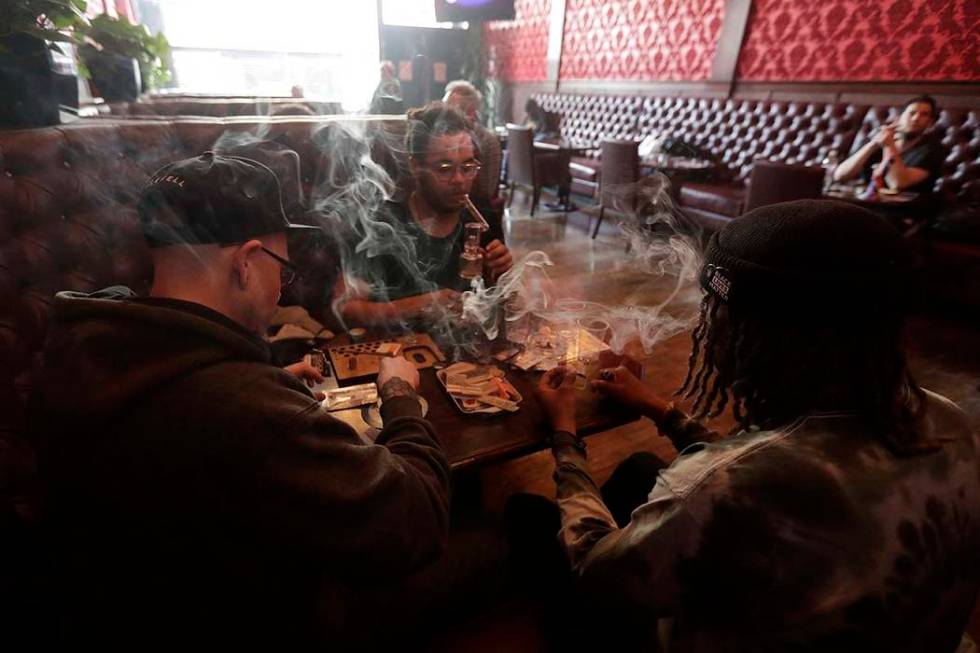First in the state, Las Vegas approves marijuana lounges

The Las Vegas City Council on Wednesday voted to permit lounges where people can consume marijuana, making the city the first in Nevada — and one of the few nationwide — to allow such businesses.
Elected officials voted 4-1 to pass the bill, sponsored by Councilman Bob Coffin, just before the draft ordinance was scheduled to expire. Councilman Stavros Anthony — a retired Metropolitan Police Department captain — voted no, preferring the city follow the lead of the state and invite other governments to weigh in.
“It can’t just be the city of Las Vegas,” Anthony said.
But a state bill to explicitly legalize marijuana lounges died this session, and Coffin was clear: “The state will catch up. We can’t wait for the state to act.”
Although there’s no provision in state law for lounges, the Legislative Counsel Bureau issued an opinion in 2017 that said under existing law, local governments could license such businesses provided that patrons were at least 21 years old and that marijuana use was not visible to the public.
The council majority viewed the bill as the next logical step after voters legalized recreational marijuana in 2016.
“I’m not advocating smoking marijuana, but what I am advocating for is making sure we as a government agency do not create criminals by basically not giving them an outlet after we’ve passed a state law,” Councilwoman Michele Fiore said.
Metro on board
The draft ordinance had cleared hurdles since Coffin introduced it in January. It received support from Las Vegas police after an element that would have allowed alcohol to be served inside the lounges was scrapped. But it was still opposed by gaming officials, who said they worried about running afoul of federal law if lounges were located close to casinos. The Nevada Gaming Commission has instructed casino license holders to disallow any use of marijuana, which is still illegal under federal law.
“We would rather see a well-crafted ordinance than a rushed one,” said Virginia Valentine, president of the Nevada Resort Association, the gaming industry’s primary state lobbying organization.
But Bryan Scott, the senior assistant city attorney, said the ordinance was two years in the making with city departments spending hundreds of hours researching the issue, touring facilities and meeting with individuals for and against the plan.
“This was truly an open and collaborative process,” Scott said.
The significance of the decision by Las Vegas to allow marijuana lounges in the city cannot be understated, according to Scot Rutledge, a partner with Argentum Partners, who had lobbied on behalf of the marijuana legalization campaign three years ago and represents cannabis businesses.
“I think this was the best possible result for today,” Rutledge said. “We are blazing a new trail here.”
He pointed to little data on social use venues to explain why so few cities have entered into the market, but he also suggested that Nevada is “really good at regulating vice” and that the city’s decision will enable it to collect the data to demonstrate its prowess in controlling it.
What did the city allow?
In authorized marijuana lounges, consumers must be at least 21 years old and must bring their own marijuana into the location. The venues cannot provide, sell distribute or store the drug, but they may sell or distribute paraphernalia, according to Darcy Adelbai-Hurd, the city’s business license section manager.
Business owners must apply for a special use permit that costs $5,000 yearly and would need to be approved by the council. For the first 12 months, only city-licensed marijuana dispensaries will be allowed to operate the lounges, according to Scott.
The provision had garnered criticism from some for limiting business owners, but Coffin noted how dispensary owners already had been thoroughly vetted by officials. Coffin said it was his intent that lounges be located adjacent to retail stores.
City spokesman Jace Radke said there were 12 licensed dispensaries in Las Vegas.
Each lounge must meet odor standards and have plans for security, training, fire safety, air quality and sanitation, according to Adelbai-Hurd. They must also be 1,000 feet from schools or casinos and 300 feet from protected institutions such as churches.
People can’t use marijuana in the view of the public or in an outdoor area, and delivery to commercial locations is prohibited under state law.
“It was overdue, really,” Coffin told the Review-Journal after Wednesday’s meeting.
Coffin noted how the proposition it would pass had been “dicey” because of the current makeup of the council. The measure needed all four votes because Mayor Carolyn Goodman had to recuse herself over family ties to the industry and because former Councilman Steve Seroka resigned two months ago.
Coffin said he was “gratified” that his colleagues saw that the gaming industry would not be harmed by the introduction of lounges. He also insisted it hadn’t dawned on him the bill’s approval might be viewed as a big deal.
“It just made sense in the progression of things,” he said.
Contact Shea Johnson at sjohnson@reviewjournal.com or 702-383-0272. Follow @Shea_LVRJ on Twitter.